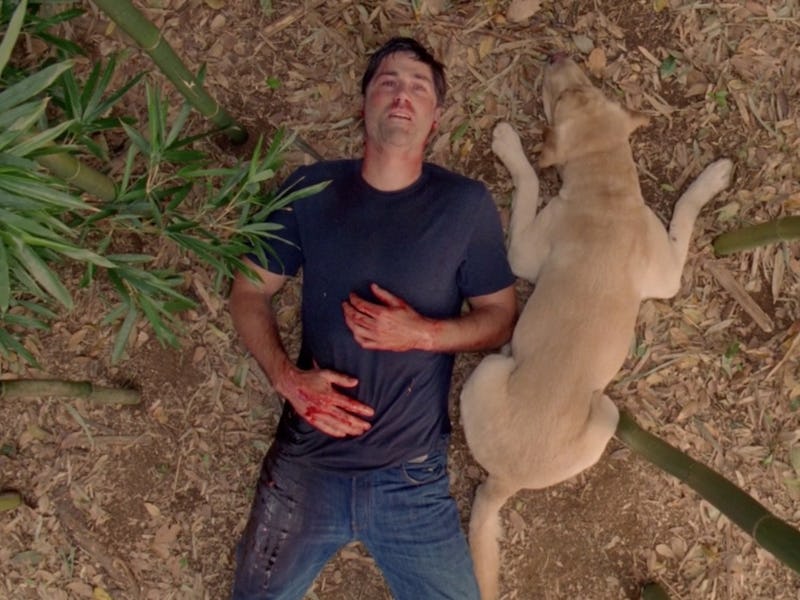Lost’s Finale Remains A Beautiful, Resounding Mess
“We’ll see you there.”

The Lost finale may be one of the most infamous final episodes in television history, so much so that its reputation precedes the rest of the show. But while its legacy as a frustrating head-scratcher remains, the rest of Lost has started to earn a reappraisal of sorts, especially after it made a buzzy return to Netflix. Suddenly, two decades after it aired, people were talking about Lost again.
That newfound appreciation moves former stars like Josh Holloway, who reunited with executive producer J.J. Abrams for his new HBO Max show Duster.
“God, it just washes over me, the love and appreciation I have for this show. I knew the show was good, but we didn't know it was going to be iconic. And we didn't know the characters were going to be iconic characters,” Holloway tells Inverse. “It was just like, ‘I get the easy role.’ That's what I used to laugh at because Matthew [Fox] had to do all the heavy lifting and cry and stuff. I was like, ‘Thank God for him. I just have to throw a few lines and swing in and out.’”
Holloway played the show’s resident bad boy, reformed con artist James “Sawyer” Ford, whose redemption arc in the final season is one of the show’s finest achievements. Season 6 sees Sawyer find the love of his life in Juliet (Elizabeth Mitchell), lose that love, and grow to become one of the fiercest protectors of his friends (and, as we see through the revelation of the Island’s purpose, a protector of the world at large).
“Being able to sink into a character and grow into that was just a phenomenal experience,” Holloway adds. “There's nothing like that.”
More than a decade since the polarizing finale aired, Holloway counts himself as one of its most loyal defenders, even if “I still don't know what happened,” he laughs.
As new viewers make their way to the finale for the first time, will they be just as infuriated as the original fans? Maybe, maybe not. But 15 years after the Lost finale confounded viewers, the beautifully messy 90 minutes of TV still resounds.
The resolution of the “flash sideways” is the true key to the finale’s success.
The two-part finale had the enormously difficult job of threading together a rushed lore drop, the ongoing action-packed Island drama, and the resolution of the curious “flash sideways” that introduced an alternate reality where the crash never happened. And of course, it had to answer the biggest mystery of all: were they dead the whole time? No, of course not. But as the finale showed, they weren’t really living either.
The finale's success lies in the “flash sideways,” a device that initially seemed like the show’s newest mystery, then slowly revealed itself to be its central thesis. Throughout the final episodes of Season 6, the survivors of Oceanic 815, all now living separate, apparently happier existences, slowly awaken memories of different lives, ones that were much messier, more complicated, and ultimately richer than the “ordinary” ones they were living.
It led to the entire group reuniting at a church to “move on,” having found nirvana in remembering their connections to each other, however painful some of them might have been. The answer to Lost, it turns out, wasn’t about what the Island really was; it was about how the relationships we form in this life will reverberate in the next.
The goofy action beats of the Island-centric storyline haven’t aged quite as well.
Yes, that boils down to “it’s actually about the friends we made along the way.” But rewatching the finale 15 years later, it’s the show’s characters and the resolutions of their relationships that are far more satisfying than any mystical mumbo jumbo happening with the “heart of the Island” or any action-packed standoff between Jack (Matthew Fox) and Locke (Terry O’Quinn). It’s fitting, then, that Holloway’s own experience on the show reflected the best parts of Lost. “There's parts of it that are hard, but those are not the parts you remember,” he says. “You remember the beauty and the most joyous parts of it.”
In the end, you don’t remember what happened with the “cork” or why keeping the smoke monster trapped on the Island was so important. It was about the beauty and joy of watching your favorite characters find each other again, and in doing so, find peace.